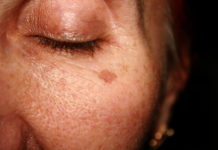While men are concerned about the size of their penis, we women tend to panic when it is time for a small oral caress, to ask nervously: “Does it smell like fish? “Hello stress and excitement that falls flat! This is obviously a concern that affects most women. According to the scientists, our vagina will keep its smell even if it is done, except where the vagina gives off a strong or unpleasant odor because it can be an infection.
It could be parasitic vaginitis, caused by the proliferation of a parasite called Trichomonas vaginalis. It is accompanied by pruritus and very fluid losses, which can range from white to green. While vaginosis is due to the bacteria Gardnerella vaginalis and associates with greyish and odorous losses.
What is a vaginal infection?
75% of women have been affected at least once during their lifetime with vaginal infection. Vaginitis is the most common form of infection contracted; It may be of infectious origin or not. It is caused by viruses, bacteria and other parasites, but in 90% of cases, it is a fungus that normally evolves in this intimate zone that is pointed at. What can titillate the fungus in question? An imbalance in the pH (vaginal acidity), menstruation, hormonal changes, pregnancy, antibiotics, hygiene and overly tight fitting clothing. Indeed, nylon underwear, wet swimwear and pantyhose hold the body warm. Moisture is conducive to the proliferation of fungus yeasts.
Bacterial Vaginosis or Yeast Vaginitis?
It is also important to distinguish between bacterial vaginosis and yeast vulvo-vaginitis. These two pathologies have similar symptoms. However, in case of bacterial vaginosis, the vaginal discharge give off a strong odor of fish. If, on the other hand, a woman has thicker, curd-like, more abundant but non-odorous discharge, a discomfort or itchiness at the entrance of the vagina, it would be a yeast vaginitis.
The various change of sexual partners, the presence of an IUD, antibiotic treatment, vaginal douching and cigarette smoking are all factors that increase the risk of developing bacterial vaginosis. This infection is also associated with serious complications during pregnancy and can lead to premature birth, fetal infections and low birth weight. Studies have shown that iron deficiency is often present in pregnant women with bacterial vaginosis.
Leucorrhea is usually accompanied by a burning sensation during urination or sexual intercourse, pain in the vagina, redness and swelling of the vulva, irritation and itching or even loss of blood outside menstruation period. It is important to do a gynecological exam to determine the type of vaginal infection that afflicts the patient.
Two Vaginal Odors That Must Alarm You

Trichomoniasis as well as bacterial vaginosis are both infections that promote the secretion of vaginal discharge with the obvious odor of fish. If the odor persists, go quickly to a gynecologist who will make a diagnosis.
If the odor is more purulent, it may be due to the presence of a foreign body in the vagina, a non-withdrawn buffer, for example, or sometimes a more serious infection. Refer to the advice of a gynecologist to dispel any suspicion.
Precautionary Measures
- Avoid bubble baths, perfumed or alcohol-based soaps and lotions, but also toilet paper, tampons or scented underwear pads.
- Clean, rinse and dry the intimate area without falling into the excess.
- Avoid feminine douche and wash that promote vaginal dryness and the appearance of mycotic vaginitis.
- Change your menstrual pads and tampons regularly.
- Use natural fiber underwear and avoid wearing too tight pants.
- Wash your underwear in warm water, to eradicate germs.
- Vitamins A, C and zinc protect the vaginal wall and stimulate immune function.
- For a vagina with a less pronounced odor, allies are fruits, vegetables, seeds and yogurts concentrated in live cultures of Lactobacillus acidophillus which help the vaginal flora regain its equilibrium.
Source:
- Santé Plus Mag


![[Photos] Why WD-40 Is Magic In Your Garden?](https://lifetonik.com/wp-content/uploads/sites/7/2019/08/WD40-Prices-Highres_Page_8_Image_0008-218x150.jpg)





![[Photos] Take A Look Of The Obama’s New Home Before It’s Banned](https://lifetonik.com/wp-content/uploads/sites/7/2019/07/Obama1-218x150.jpg)

![[Slideshow] Celebrity Homes: 21 Of The Most Luxurious](https://lifetonik.com/wp-content/uploads/sites/7/2019/07/Taylor-Swift-218x150.jpg)
![[Slideshow] More Parents Are Now Gluing Pennies to the Bottom of their Kid’s Shoes](https://lifetonik.com/wp-content/uploads/sites/7/2019/07/Keep-Them-Entertained-218x150.jpeg)
![[Photos] 20 Fashion Mistakes That Too Many Women Make!](https://lifetonik.com/wp-content/uploads/sites/7/2019/07/5-style-mistakes-that-make-you-look-frumpy-featured-218x150.jpg)



















![[Gallery] 25 Discounts For Seniors To Which You Are Entitled Without Knowing It](https://lifetonik.com/wp-content/uploads/sites/7/2019/08/EAZxECUXUAAvNZR-218x150.jpg)
![[Slideshow] Here’s the salary of every governor in the United States](https://lifetonik.com/wp-content/uploads/sites/7/2019/08/Charlie-Baker-218x150.jpg)
![[Photos] No One Will Want To Buy This House After Seeing These Pictures](https://lifetonik.com/wp-content/uploads/sites/7/2019/08/terrible-real-estate-photos-2-5c35e727c9f95__700-218x150.jpg)




